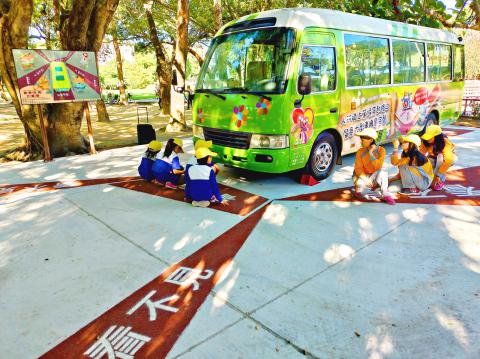A traffic safety park for children opened yesterday at the Youth Park in Taipei’s Wanhua District (萬華) to teach children about traffic safety issues.
Deputy Minister of Transportation and Communications Chi Wen-chung (祁文中) and Taipei Department of Transportation Director Chen Hsueh-tai (陳學台) said the establishment of the park is an important step toward preventing traffic-related deaths and injuries among children.
Aimed at children aged six to 12, the park employs a series of games focused on safety issues, the ministry said.

Photo: CNA
Teachers can guide students in playing the games, which are designed to raise awareness of personal safety around roadways and motor vehicles, it said.
The park is divided into seven learning zones: road signs and crossings — for which there are two zones each, safe waiting practices, traffic blind spots, and alleys and other narrow roadways.
It aims to teach children safe ways to cross the road, such as using crosswalks, pushing buttons for signals where they exist, and wearing bright or reflective clothing or accessories, the ministry said, adding that it would review the park’s teaching materials to determine their effectiveness.
About 60 percent of traffic accidents occur at crossings, and among those involving children 12 years old or younger, about 14 percent were due to a motor vehicle striking and killing the child, the ministry said.
The ministry plans to introduce measures between next year and 2022 to improve traffic safety, it said.
These include installing more button-activated crossing signals near schools and distributing short films on traffic education to elementary schools, alongside a proposal requiring schools to show a minimum of four hours of safety videos in class per academic year, it said.
Aside from referencing practices in Japan, Singapore and Hong Kong, ministry representatives spoke with schools in Taipei, Kaohsiung, Tainan and Miaoli to develop ideas for traffic safety parks, it said.
One park opened next to Kaohsiung’s National Science and Technology Museum, which held 236 sessions during its trial run from Sept. 1 to Nov. 15, it said.

The Ministry of Economic Affairs has fined Taobao NT$1.2 million (US$36,912) for advertisements that exceed its approved business scope, requiring the Chinese e-commerce platform to make corrections in the first half of this year or its license may be revoked. Lawmakers have called for stricter enforcement of Chinese e-commerce platforms and measures to prevent China from laundering its goods through Taiwan in response to US President Donald Trump’s heavy tariffs on China. The Legislative Yuan’s Finance Committee met today to discuss policies to prevent China from dumping goods in Taiwan, inviting government agencies to report. Democratic Progressive Party Legislator Kuo Kuo-wen (郭國文) said

The Ministry of Economic Affairs has fined Taobao NT$1.2 million (US$36,900) for advertisements that exceeded its approved business scope and ordered the Chinese e-commerce platform to make corrections in the first half of this year or its license would be revoked. Lawmakers have called for stricter supervision of Chinese e-commerce platforms and more stringent measures to prevent China from laundering its goods through Taiwan as US President Donald Trump’s administration cracks down on origin laundering. The legislature’s Finance Committee yesterday met to discuss policies to prevent China from dumping goods in Taiwan, inviting government agencies to report on the matter. Democratic Progressive Party

Taiwan and its Pacific ally Tuvalu on Tuesday signed two accords aimed at facilitating bilateral cooperation on labor affairs, according to Taiwan’s Ministry of Foreign Affairs (MOFA). The governments inked two agreements in Taipei, witnessed by Foreign Minister Lin Chia-lung (林佳龍) and visiting Deputy Tuvaluan Prime Minister Panapasi Nelesone, MOFA said in a news release. According to MOFA, the agreements will facilitate cooperation on labor issues and allow the two sides to mutually recognize seafarers’ certificates and related training. Taiwan would also continue to collaborate with Tuvalu across various fields to promote economic prosperity as well as the well-being of their

Sung Chien-liang (宋建樑), who led efforts to recall Democratic Progressive Party (DPP) Legislator Lee Kun-cheng (李坤城), was released on bail of NT$80,000 today amid outcry over his decision to wear a Nazi armband to questioning the night before. Sung arrived at the New Taipei District Prosecutors’ Office for questioning in a recall petition forgery case last night wearing a red armband bearing a swastika, carrying a copy of Adolf Hitler’s Mein Kampf and giving a Nazi salute. Sung left the building at 1:15am without the armband and covering the book with his coat. Lee said today that this is a serious